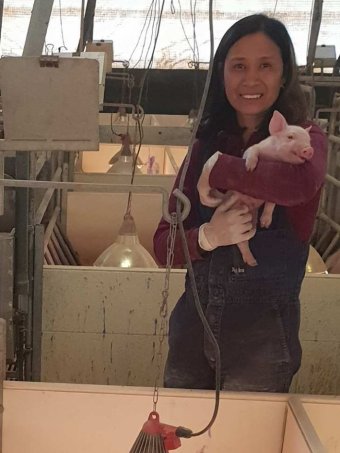
The Regional Australia Institute has released a policy paper calling for a new federation approach to meeting the labour needs of communities outside the major cities.
It points to the success of communities across the country that have embraced migration, which has assisted with worker shortages and kept schools and shops open as a result.
"We've seen rural communities go from a place of population decline to 10 or 15 per cent population growth," chief executive of the Regional Australia Institute, Jack Archer said.
"We've seen business be able to expand and we think that's something that can be replicated around the country."
The Regional Australia Institute wants the Federal Government to designate regional communities with worker shortages as 'priority settlement areas'.
Mr Archer said these would be in regional towns where there were communities that wanted to support new arrivals.
"We need communities to get past worries whether migrants are going to change things and really embrace the idea of change and new people coming to those communities," he said.
"For minimal investment [and] some simple policy changes that really won't cost anything, we think you can make a really significant shift.
"You can meet workface needs that are unmet."
The Regional Australia Institute wants the Federal Government to expand so-called priority settlement areas and allow up to an extra 3,000 permanent migrants each year.
These would be in regional towns where there are worker shortages and a community that was willing to support new migrant arrivals.
Migrant worker finds new home in regional Victoria
When Marilyn Fernandez arrived in Australia, she had no idea what was ahead of her.
"When I left the Philippines my youngest was only 11 months old," she said.
"I have five children and I'm just thinking 'I need to go here for a bright future for my children'."
Ms Fernandez had worked in piggeries for years.
But when financial hardship set in in 2008, she seized an opportunity to join an Australian piggery when owner Tom Smith came to her country looking for workers.
"One of the schools would have been closed down if it wasn't for the Filipinos and the local grocery store is still functioning whereas every chance it would have folded, it's seen everywhere," Mr Smith said.
The sixth-generation pig farmer lives in Pyramid Hill, about an hour north of Bendigo in central Victoria.
He went looking for workers in the Philippines because he struggled to find anyone locally.
"With the Aussies, piggeries were the last resort in terms of employment. Whereas with the Filipinos, piggeries are their chosen career," he said.
Mr Smith's family business has proved a driving force in Pyramid Hill attracting migrant workers. Today, almost one in five residents are from the Philippines.
After witnessing years of decline, he said he was thrilled to see his community growing in size again.
"There are a lot of Filipinos working in agriculture now, piggeries especially. In our local areas, dairy farms have kicked in on it as well and even the local hostel and so forth, they're employing Filipinos as staff as well," he said.
"Filipinos have been making a great contribution to our society."
Such was the community support for migrant workers, the Pyramid Hill community raised funds so Ms Fernandez's family could be reunited and settle permanently in Australia.
Community-led approach needed to attract migrants
The Regional Australian Institute will today host a forum at Parliament House in Canberra to discuss rural worker needs.
Deputy Prime Minister Michael McCormack and Labor agriculture spokesman Joel Fitzgibbon will speak at the event.
It comes as the Federal Government contemplates changes to regional skilled visas, which would bind migrants to rural areas for a set period of time.
But Mr Archer said forcing people to live in regional areas would fail to deliver the outcomes regional communities needed.
"We want people to come to regional areas who have aspirations to work and live in those communities for the long term and so visa conditions that support them to do that is what we need," he said.
"In the end, if you try to force people to do things it probably won't get you the result you're hoping for."
FOR FULL STORY PLEASE CLICK THE LINK BELOW:
www.abc.net.au/news/2018-05-22/migrant-workers-needed-to-stop-population-decline/9784458

 RSS Feed
RSS Feed